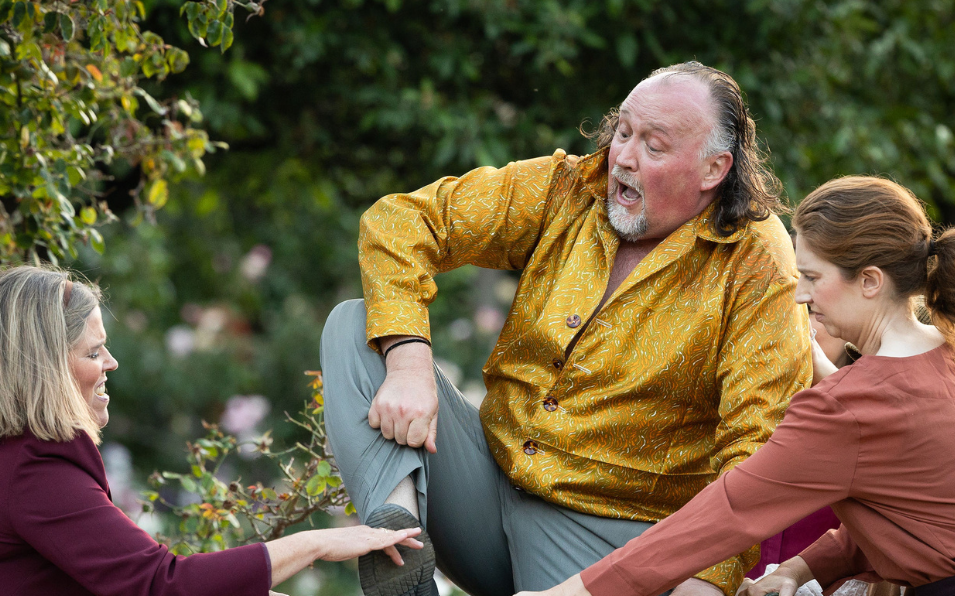The Merry Wives of Windsor is one of Shakespeare’s lesser-known plays, about two wealthy women who collude to humiliate a salacious buffoon who has attempted to woo them both into helping him out of his financial troubles. Like a modern day man sending the exact same ‘you’re-so-beautiful-let’s-hook-up’ text to two women who are friends, Falstaff underestimates the subjects of his mission. Melbourne Shakespeare Company was right: in 2022, the play is ripe for adaptation.
So it’s perhaps surprising that The Merry Wives has been recontextualised to the 1970s rather than current or recent times, a decision apparent from the earth-toned blazers and flared pants, an assemblage of Women’s Movement posters and hearty acoustic renditions of 70s era songs. The Partridge Family’s ‘I Think I Love You’, which doubles as a very funny display of Falstaff’s doggedness, is among the finest examples of music enriching the narrative.
On a warm and blue-skied Friday evening, The Merry Wives’ venue – a stately, rose-filled sector of St Kilda Botanical Gardens – was advantageous. Members of the large ensemble, whose character names were stitched to their clothing (a helpful touch) intermittently chatted and sipped drinks right next to the audience (aiding verisimilitude) or dawdled exaggeratedly amid the hedges while awaiting their cues, rounding out the show’s playful tone.
Physical comedy is this production’s greatest strength, and Amanda McKay embodies Mistress Page with such gusto and precision that other performances can seem uninspired by comparison. McKay, and Alice Albon in the role of Shallow, enunciate every syllable, a crucial criterion for most plays, but especially when the language spoken is Early Modern English.
By rushing through already-abstruse lines, actors stifle the clarity of interactions, an even tougher thing for viewers unfamiliar with the text, given the play involves so much deception and misapprehension. (This tendency seemed due in part to the pressure to squeeze so much farcical action into 90 minutes; excising repetitive bits of dialogue or just extending the show’s runtime may have been better calls.)
A subplot to Mistress Page and Mistress Ford’s orchestration of revenge was the frowned-upon romance between Anne Page and a gender-swapped Fenton. In the original play, Fenton’s reckless spending appals Anne’s father, but in this version it isn’t clear whether it is this weakness or homophobia (or both, or neither) that compels Master Page’s aversion to their union. On opening night, co-director Kate Weston (who is not an actor) gamely subbed for Lucy May Knight as Anne, so I may have seen a less revealing conveyance of love than was intended.
Read: Book review: Berani, Michelle Kadarusman
As in a Disney musical, The Merry Wives doubles-down on the ‘merry’ in its title, which was an appreciated end to my week. But in a production so replete with opportune moments, and so obliged to run like clockwork for emotions and jokes to land, I had hoped for something more ingenious and cogent, something that underscored more fiercely the messages at its core.
The Merry Wives of Windsor by William Shakespeare
Melbourne Shakespeare Company
St Kilda Botanical Gardens
Directed by Emma Austin and Kate Weston
Producer: Michael Mack
Artistic Director: Jennifer Sarah Dean
Musical Director: Natalie Calla
Stage Manager: Ellie Brindle
Set Designer: Hayley James
Costume Designer: Emily Busch
Assistant Stage Manger/Swing: Ben Margalith
Cast: Alice Albon, Chris Broadstock, Sarah Clarke, Andrew Dang, Ellis Dolan, Tref Gare, May Jasper, Lucy May Knight, Sebastian Li, Amanda McKay, Paul Robertson, Elle Sejean-Allen, Bridget Sweeney, John Viscay-Wilson
Tickets: $20-$35
The Merry Wives of Windsor will be performed until 24 December 2022.





